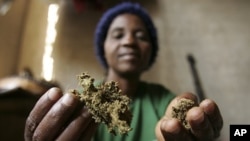With cancer rates in Senegal rising, traditional healers and medical doctors hope to collaborate for better treatment.
Serigne Samba Ndiaye was trained by his father as a traditional healer and herbalist. At his private clinic on the outskirts of Dakar, he treats everything from insomnia to cancer.
Ndiaye say he grinds kola nuts into a powder that he uses to treat breast cancer. Ndiaye says more and more of the 40 to 50 patients he sees each day are suffering from cancer, and they are increasingly turning to traditional medicine.
A few kilometers away in downtown Dakar, lines of men and women fill the hallways of the Cancer Institute, the only clinic of its kind in West Africa. Some patients are visiting from neighboring Mali, Mauritania, Guinea and The Gambia.
Institute director Mammadou Diop says cancer in Africa is far different than when he was in medical school.
Dr. Diop says at the time they called cancer ‘a disease of the rich’, and students were told it was an illness that only existed in Western countries.
The World Health Organization estimates that by 2020 more than half of all cancer cases worldwide will be in developing countries, with a million new cases a year in Africa.
Dr. Diop says it is clear cancer rates are rising, with the most common forms in this country of 12 million people being cancer of the uterus, liver, blood, prostate and lymph nodes.
He says this is due to several factors, including an aging population, poor diet and lifestyle choices, a high rate of infectious disease, and an increased use of tobacco and alcohol.
Erick Gbodossou opened the Malango Center for Traditional Medicine in Fatick, about 150 kilometers southeast of Dakar. He believes the term "cancer" is not appropriate for Africans.
Dr. Gbodossou says they talk of cancer because of their education, which is colonial. Africans believe that all illness is related to the environment. It is not a virus or bacteria that brings on illness, but the surroundings that favor some infections over others.
Dr. Gbodossou says in this traditional view, the real cause of cancer is an imbalance in the energy that comes from where and how people live.
Nearly half of Senegal’s population lives in cities. In Dakar, the rapid rate of construction and the high cost of materials mean that some houses are built using garbage as filler because it is cheap and accessible.
The World Health Organization says with these piles of rotting trash and toxic waste come more illness, including tuberculosis, yellow fever and malaria. Those illnesses weaken immunity and make people more susceptible to developing some forms of cancer.
In Senegal, traditional treatments rely largely on locally grown plants, such as kenkileba, tamarind and jatropha. But Dr. Gbodossou says treating cancer involves more than just herbs.
Dr. Gbodossou says there are important rites and rituals to re-establish the body’s equilibrium. There are also techniques and exercises to improve the energy, like deep breathing, organ massage, and what they call "causerie," which is a type of group discussion.
One of the attractions of traditional medicine is its price. The majority of Senegalese still live on about $2 a day, and Western medicine is expensive. Dr. Diop says only about one percent of the local population can afford pharmaceutical cancer drugs.
He says even those who can afford to see doctors are reluctant to admit they also consult traditional healers.
Dr. Diop says many of his patients are afraid of being stigmatized. They assume the medical community considers all traditional healers as charlatans.
The absence of laws to regulate herbal treatments or evaluate alternative rituals and techniques has made it easier for people to exploit the practice of traditional medicine.
Dr. Gbodossou says the art of healing, before colonization, did not have charlatans. The art of healing was not a way to make money. Before working as a healer, they were also farmers or animal breeders. That gave them money to live. We say a hungry healer cannot be real healer. So before colonization there was no reason to exploit each other. We did it for free.
As cancer rates continue to climb in Senegal, doctors from both practices realize the importance of combining efforts.
Dr. Diop says Senegal's medical community can never do the same amount of research as Western countries, so they need to lift certain barriers and prejudices here so people can benefit from the best of both systems.
For traditional practitioners, there are still some stereotypes to overcome before they can prove their worth to the greater medical community.
Dr. Gbodossou says a type of hierarchy exists between the medical and traditional communities. But he is convinced that if the scientific and political communities collaborate with traditional doctors based on mutual-respect, everyone will benefit.










